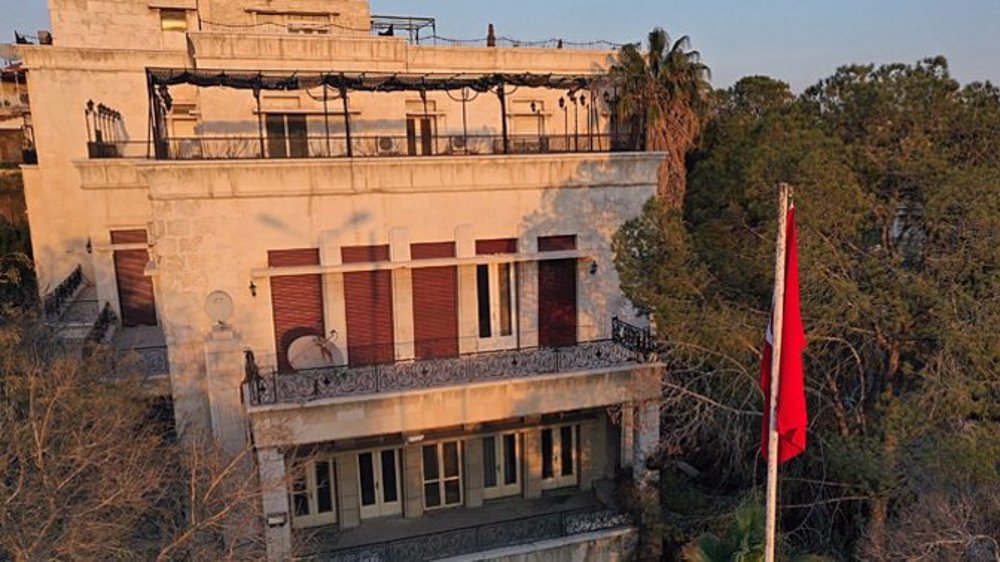Turkish army stationed 30km inside Iraq: PM Yildirim
Turkish Prime Minister Binali Yildirim says the country’s troops have been “deployed 30 kilometers inside” Iraq and in its northern regions in a declared goal of eliminating militants of the outlawed Kurdistan Workers’ Party (PKK).
“These operations have started in March. So far, we have been deployed in a 300-kilometer area, in 30 kilometers deep in northern Iraq. It’s beyond may be Qandil, Makhmur or Sinjar,” said the Turkish premier during a special live broadcast on Turkish news channel NTV late on Friday.
Yildirim’s comments came just a day after Turkish President Recep Tayyip Erdogan said Turkey might strike the Iraqi city of Qandil “at any moment one evening.” On Monday, Turkish Interior Minister Suleyman Soylu had also said Ankara was “waiting” for the right time to launch a military operation against purported positions of the PKK in Qandil.
The Qandil Mountains are located roughly 40 kilometers southeast of the Turkish border in Iraq's Erbil province. Ankara believes the rugged region is being used as the headquarters of the PKK, which has been seeking an autonomous Kurdish region since 1984.
Turkey has conducted frequent airstrikes against the PKK targets in northern Iraq. It previously carried out cross-border operations in the region in the 1990s and 2000s. A shaky ceasefire between Ankara and the PKK that had stood since 2013 was declared null and void by the militants in 2015 in the wake of a large-scale Turkish campaign against the group.
In December 2015, tensions flared up between Baghdad and Ankara when Turkey deployed 150 heavily armed soldiers backed by 20 to 25 tanks to the Bashiqa military base in Iraq’s northern province of Nineveh, where it claimed it was training Iraqi Kurdish Peshmerga fighters battling the Daesh Takfiri terrorist group.
In late March, the Turkish government also said that it had commenced operations against Kurdish forces in Iraq's Sinjar region, despite Iraq's announcement that no foreign forces had crossed the border into the country. A few days later, Iraq also started deploying forces in Sinjar.
Ankara has previously said that it would attack northern Iraq if the central government in Baghdad and the United Nations did not take steps to eliminate the PKK militants. It also claims that the Makhmur camp, which is located 100 kilometers south of the Kurdistan Regional Government (KRG)’s capital Erbil and was purportedly overrun by the PKK militants, must be shut down due to security threats.
Baghdad, however, has time and again strongly condemned any violation of its sovereignty and territorial integrity, including those committed by Ankara, saying any foreign anti-terror operation inside the Arab country must be conducted based on the permission of Baghdad.
In response to a question if there will be cooperation with Iran and Iraq over Qandil operation, Yildirim said the “PKK harms everyone. I don’t think we will have any problem [on this issue]”, adding that Ankara was carrying out “serious diplomacy” with both Tehran and Baghdad.
Separately, Turkey’s Defense Minister Nurettin Canikli said Turkish forces have neutralized over 500 PKK militants in northern Iraq so far this year. The Turkish military generally uses the term “neutralize” to signify that the militants were killed, captured or surrendered.
The Turkish government has been opening military fronts against Kurdish groups in Syria as well. Earlier this year, it launched the ongoing Olive Branch offensive against the purported positions of the US-backed People's Protection Units (YPG) Kurdish militia in Syria's western enclave of Afrin.
Ankara considers the YPG as a terror group and as the Syrian branch of the PKK. Both offensives were conducted in flagrant defiance of Damascus.
China slams US as ‘war-addicted’ threat to global security
China ‘firmly opposes’ US military aid to Taiwan
VIDEO | Press TV's News Headlines
President Yoon Suk Yeol to be removed from office
At least 19 Gazans killed by Israeli airstrikes since dawn: Medics
Leader: Iran neither has nor needs proxy forces
US fighter aircraft shot down ‘in friendly fire’ amid aggression on Yemen
Yemeni FM: Israel’s sponsors accountable for ongoing aggression on Sana’a
















 This makes it easy to access the Press TV website
This makes it easy to access the Press TV website